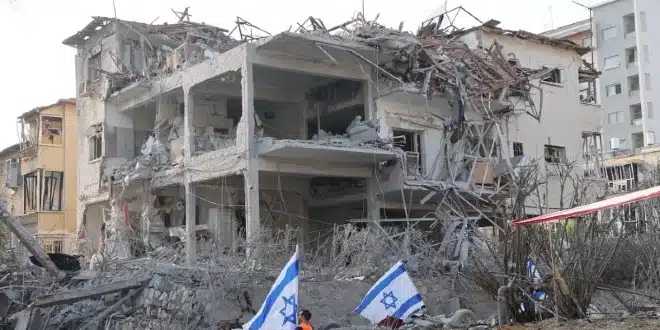As tensions escalate in the Middle East, the recent Israeli airstrikes on Iran’s nuclear facilities have intensified the longstanding debate over Tehran’s nuclear ambitions. While Israel asserts that Iran is nearing the capability to produce nuclear weapons, U.S. intelligence assessments suggest a more nuanced reality.
Israel’s Operation Rising Lion targeted key Iranian nuclear sites, including the Natanz facility, citing intelligence that Iran was approaching a critical threshold in its nuclear development. Prime Minister Benjamin Netanyahu emphasized the urgency, stating that Israeli intelligence indicated Iran was clandestinely advancing toward weaponizing uranium.
Contrastingly, U.S. intelligence agencies maintain that Iran has not resumed a formal nuclear weapons program. Director of National Intelligence Tulsi Gabbard testified in March that, despite Iran’s significant stockpile of enriched uranium, there is no evidence of active weaponization efforts. She noted that Supreme Leader Ayatollah Ali Khamenei has not authorized the revival of the nuclear weapons program suspended in 2003.
President Donald Trump, however, has publicly dismissed these assessments, asserting that Iran is “very close” to developing a nuclear weapon. He has expressed skepticism toward U.S. intelligence conclusions, aligning more closely with Israel’s perspective on the immediacy of the threat.
Impact of Israeli Strikes and Iran’s Nuclear Capabilities
The Israeli strikes have reportedly caused damage to Iran’s nuclear infrastructure, including the Natanz enrichment facility. However, U.S. officials suggest that these attacks may have only temporarily delayed Iran’s nuclear progress by a few months. The Fordow facility, another major enrichment site fortified deep underground, remains operational and was not targeted in the strikes. Experts indicate that effectively neutralizing Fordow would require specialized weaponry and capabilities beyond Israel’s current arsenal.
The International Atomic Energy Agency (IAEA) has reported that Iran possesses approximately 408.6 kilograms of uranium enriched up to 60%, a level close to weapons-grade. While this stockpile is concerning, converting it into a functional nuclear weapon would require additional steps, including further enrichment and the development of a reliable delivery system. Analysts estimate that, if Iran decided to pursue weaponization, it could produce enough weapons-grade uranium for a nuclear bomb within a few weeks, but assembling a deliverable weapon would take significantly longer.
In response to the escalating situation, the U.S. has repositioned military assets to enhance readiness in the region. The USS Nimitz Carrier Strike Group has been deployed to the Middle East, joining other naval forces to protect American interests and allies. Additionally, U.S. Navy ships have intercepted missiles aimed at Israel, underscoring the potential for broader regional conflict.
Despite these military movements, President Trump has expressed reluctance to engage directly in Israel’s military operations against Iran. He has called for diplomatic solutions and urged both nations to engage in talks to prevent further escalation. However, the U.S. has not ruled out involvement if the situation deteriorates further.
International Reactions and Diplomatic Efforts
The international community has expressed concern over the potential for a wider conflict. The G7 and European Union have called for de-escalation and emphasized the importance of diplomatic engagement. Meanwhile, Iran has condemned the Israeli strikes as violations of international law and has vowed to continue its nuclear program, which it insists is for peaceful purposes.
Negotiations between the U.S. and Iran, previously facilitated by Oman, have stalled in the wake of the recent hostilities. Iran demands the lifting of sanctions and recognition of its right to enrich uranium, while the U.S. seeks stringent verification measures to ensure the peaceful nature of Iran’s nuclear activities.
The recent Israeli airstrikes have intensified the debate over Iran’s nuclear ambitions, highlighting the divergence between Israeli and U.S. intelligence assessments. While Israel views Iran as an imminent nuclear threat, U.S. agencies suggest that, although Iran has made significant progress in uranium enrichment, it has not resumed a formal weapons program. The situation remains fluid, with diplomatic efforts facing significant challenges and the potential for further military escalation posing risks to regional stability.


